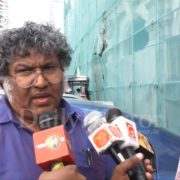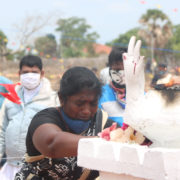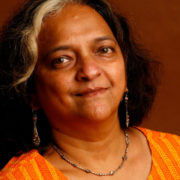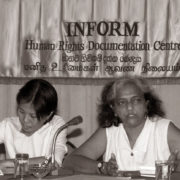සිංහල පරිවර්තනය පහළින් ඇත.
Click here to download the full report.
Executive Summary
UN High Commissioner for Human Rights Visits Sri Lanka
From 23–26 June 2025, UN High Commissioner for Human Rights Volker Türk visited Sri Lanka, meeting government officials, civil society, and victims to assess the country’s human rights situation. He focused on reconciliation and transitional justice, stressing the need for credible accountability mechanisms and the State’s responsibility to ensure justice. Türk highlighted ongoing surveillance and harassment of human rights defenders, persistent reports of torture and custodial deaths, and called for reforms in the security and justice sectors including the repeal of the Prevention of Terrorism Act (PTA), the Online Safety Act, and laws criminalizing same-sex relationships. He particularly expressed concern over slow progress on issues such as enforced disappearances.
Key Findings from HRMI Survey 2025
In June 2025, the Human Rights Measurement Initiative (HRMI) released its 2024 scores for Sri Lanka. Arbitrary arrest, torture, freedom of expression, and freedom of association remained in the “bad” range, despite slight improvements. Freedom from torture scored 5.1/10—the lowest in this category—followed by 5.2/10 for freedom from arbitrary arrest. Freedom of assembly and association, and freedom of opinion and expression both scored 5.2/10, also in the “bad” range. Sri Lanka also recorded low scores in education, reproductive health, and the right to water, raising serious concern.
Click here to download the full report.
Freedom of Expression and Media
In May and June 2025, the Ministry of Mass Media released the Draft of the National Media Policy, originally made in July 2024 before the current government took office. The policy includes positive provisions such as affirming media rights, editorial independence, journalist safety, and proposing a co-regulation model involving both the state and civil society. However, media rights groups have flagged gaps, particularly the lack of measures to reduce state control and ensure legal safeguards for implementation.
Retired Brigadier Shammi Kumararatne, the main suspect in the 2011 disappearance of journalist Prageeth Eknaligoda, was arrested for repeatedly threatening a key witness by phone.
A female sub-editor at a state-run newspaper was reinstated after the Supreme Court ruled in her favor in a political transfer case. In Nuwara Eliya, journalists were initially barred from covering the District Coordination Committee meeting on the 11th. An interim restraining order was issued against two YouTubers and a former politician, prohibiting them from making any further comments about MP Mujibur Rahuman. In a live-streamed social media video, Rahuman also stated that he had lodged a complaint against a senior journalist for allegedly making a false statement about him on social media. It was further reported that the CID has launched an investigation into alleged defamatory statements made on social media against staff members of the Attorney General’s Department.
Sri Lanka Core Group Meeting at UNHRC
At the 59th UN Human Rights Council session, the Sri Lanka Core Group—Canada, Malawi, Montenegro, North Macedonia, and the UK—expressed deep concern over the lack of substantive progress on human rights, accountability, and reconciliation. They criticized continued use of repressive laws and impunity in cases such as enforced disappearances, and reiterated willingness to engage constructively with the government.
Click here to download the full report.
Mass Graves and Accountability
Excavations at the Chemmani mass grave revealed evidence of mass killings, with at least 33 skeletal remains unearthed in June. Families of the disappeared, human rights groups, and political leaders called for transparent, internationally monitored investigations. Civil society groups submitted a letter to the High Commissioner urging urgent international intervention. Tamil families of the forcibly disappeared in the North and East marked over 3,000 days of continuous protest, demanding justice through an international inquiry due to impunity in domestic processes.
Land Rights
The Supreme Court suspended a government gazette seeking to declare all unclaimed land in the North and East as state property. The Mallakam Magistrate’s Court issued injunctions against 27 individuals and organizations protesting land appropriation for Tissa Viharaya in Jaffna. The Fisheries Minister announced compensation or alternative land for Tamil landowners affected by the temple’s construction. Opposition MPs raised concerns about unauthorized clearing of 8,000 acres for an Air Force base in Mullaitivu, surveying of private lands near a Navy camp in Mannar, and prolonged military occupation of 2,400 acres in Valikamam North. In Batticaloa, the Eravur Magistrate’s Court acquitted 30 people charged over a land rights protest.
Legal Reforms
The Cabinet is drafting legislation to ban corporal punishment. The government plans to replace the PTA, though civil society opposes introducing new counterterrorism laws, arguing the existing framework suffices. Justice Minister Nanayakkara insists a new law is needed to address global terrorism threats. In a landmark ruling, the Supreme Court held that refusing to recognize Bhikkhunis and assigning them the lesser Dasasil Matha status when issuing national ID cards violates fundamental rights under the Constitution.
Rights of Marginalized and At-Risk Groups
Sri Lanka’s handling of refugee and asylum seeker cases has drawn criticism, triggering calls for urgent policy reform. In June, a UNHCR-certified refugee returning from India was detained at Palaly Airport under outdated laws. According to some Ministers, the government is considering legal reforms. Separately, 116 Rohingya asylum seekers have been held at an SLAF camp in Mullaitivu since December 2024. The government has denied UNHCR access, classifying them as “illegal migrants” and stating that only courts can decide their status. The Cabinet of Ministers have granted approval for the long-awaited Sign Language Bill, formally recognising sign language as an official means of communication. In Mullaitivu, two Tamil farmers from Kurunthurmalai, arrested for cultivating land claimed by a Sinhala Buddhist monk as an archaeological site, were released as court found no evidence to claim that it is an archeological site. An activist from Batticaloa was arbitrarily arrested at his workplace without a warrant, detained for several hours, and subjected to physical assault by prison officers before being released without charges. The Supreme Court ordered two police officers to personally compensate a victim of illegal arrest and torture. The Chairperson of the Trincomalee District Association of Families of the Forcibly Disappeared, Sebastian Devi, was subjected to a lengthy interrogation by the Terrorism Investigation Division, pressured to disclose affiliations with numerous organizations and questioned about international advocacy work. Tensions also escalated at sea, where a 23-year-old Tamil fisherman from Kuchchaveli was critically injured after Sri Lankan Navy personnel opened fire during an alleged anti-poaching operation.
Labour rights
The sudden and controversial shutdown of NEXT Manufacturing Ltd.’s garment factory in the Katunayake Free Trade Zone (FTZ), which resulted in the loss of employment for over 1,400 workers with little warning and conflicting explanations, has drawn significant criticism from various stakeholders. A joint statement from a coalition of trade unions and advocacy groups described the closure as “union-busting dressed up as a business strategy,” noting that it was the only unionized factory in the area and had successfully secured safer working conditions and other rights through collective bargaining.
Click here to download the full report.
ශ්රී ලංකාවේ මානව අයිතිවාසිකම් තත්වය 2025 ජුනි
විධායක සාරාංශය
එක්සත් ජාතින්ගේ මානව අයිතිවාසිකම් මහ කොමසාරිස් ශ්රී ලංකාවට පැමිණේ.
එක්සත් ජාතීන්ගේ මානව අයිතිවාසිකම් මහ කොමසාරිස් වෝකර් ටර්ක් රටේ පවතින මානව අයිතිවාසිකම් තත්වය තක්සේරු කිරීමට 2025 ජුනි මස 23 සිට 26 දක්වා ශ්රී ලංකාවට පැමිණ ආණ්ඩුවේ නිලධාරීන්, සිවිල් සමාජය සහ වින්දිතයන් හමු වූයේය. ඔහු විශ්වාසය තැබිය හැකි වගවීමේ යාන්ත්රණයන් සහ යුක්තිය තහවුරු කිරීමට ඇති රජයේ වගකීමේ අවශ්යතාවය අවධාරණය කරමින් සංහිඳියාව සහ සංක්රාන්තික යුක්තිය කෙරේ අවධානය යොමු කෙළේය. දැනට සිදු වෙමින් පවතින මානව අයිතිවාසිකම් ආරක්ෂකයන් සෝදිසි කිරීම සහ හිරිහැර කිරීම, වධහිංසා පැමිණවීම් සහ අත් අඩංගුවේ දී මිය යෑම් ඉස්මතු කර දැක් වු ටර්ක් ත්රස්තවාදය වැළැක්වීමේ පනත, මාර්ගගත ආරක්ෂාව පිළිබඳ පනත සහ සම ලිංගික සම්බන්ධතා අපරාධයක් කිරීමේ නිති අහෝසි කිරීම ඇතුළත් ආරක්ෂාව සහ අධිකරණ ක්ෂේත්රෙය් ප්රතිසංස්කරණ ඉල්ලා සිටියේය. ඔහු විශේෂයෙන්ම බලහත්කාරයෙන් අතුරුදහන් කිරීම් වැනි ප්රශ්න ගැන පවතින මන්දගාමී ප්රගතිය ගැන කණස්සල්ල පළ කෙළේය.

එක්සත් ජාතීන්ගේ මානව අයිතිවාසිකම් මහ කොමසාරිස් වෝකර් ටර්ක් යාපනයේ චෙන්මනි සමූහ මිනී වලට බැලීමට ගොස් යුද්ධයේ අවසාන අදියරේ දී මරා දමන ලද සහ බලහත්කාරයෙන් අතුරුදහන් කළ අය සිහිපත් කිරීමට දැල් වූ පහන ඉදිරියේ මල් තැන්පත් කෙළේය. ඡායාරූප අනුග්රහය: Tamil Guardian
HRMI 2025 සමීක්ෂණයේ ප්රධාන සොයා ගැනීම්
මානව අයිතිවාසිකම් මැනීමේ මුලපිරුම අනුව පසුගිය වසරේ ශ්රී ලංකාවේ මානව හිමිකම් තත්වයේ සුළු වර්ධනයක් පෙන්නුම් කළ ද අත්තනෝමතික අත් අඩංගුවට ගැනිම, වධ හිංසා පැමිණවීමෙන් නිදහස, ප්රකාශනයේ නිදහස සහ සංගම් පැවැත්වීමේ නිදහස යන දර්ශකවලින් තවමත් පසුවන්නේ ‘නරක“ තත්වයේ ය. වධ හිංසාවලින් නිදහස යන දර්ශකයේ 5.1/10 ක් පෙන්නුම් කළ අතර එය එම කාණ්ඩයේ අඩුම දර්ශකය යි. අත්තනෝමතික අත් අඩංගුවට ගැනීමෙන් නිදහස දර්ශකයේ අගය 5.2 / 10කි. රැස්වීමේ සහ සංගම් පැවැත්වීමේ නිදහස සහ මතයක් දැරීමේ සහ ප්රකාශනයේ නිදහස දර්ශකයේ අගය 5.2/10 ක් වන අතර එය පවතින්නේ ද ‘නරක“ කාණ්ඩයේය. අධ්යාපනය, ප්රජනන සෞඛ්යය සහ ජලයට ඇති අයිතිය කාණ්ඩයේ ද ලබා ඇත්තේ අඩු අගයක් නිසා බලවත් කණස්සල්ලක් මතු කරවයි.
ප්රකාශනයේ නිදහස සහ මාධ්යය
2025 මැයි සහ ජුනි මස ජනමාධ්ය අමාත්යංශය වත්මන් රජය බලයට පත්වීමට පෙර 2024 දී කෙටුම්පත් කරන ලද ජාතික ජනමාධ්ය ප්රතිපත්ති කෙටුම් පත ඉදිරිපත් කෙළේය. මෙම ප්රතිපත්තියට මාධ්ය අයිතිවාසිකම් සහතික කිරීම, කතෘ නිදහස, ජනමාධ්යවේදීන් ගේ ආරක්ෂාව සහ රාජ්යය සහ සිවිල් සමාජය නියෝජනය කරන සම- නියාමන ආදර්ශයක් යෝජනා කිරීම වැනි සාධනිය ප්රතිපාදන ඇතුළත් ය. කෙසේ වුවත් මාධ්ය අයිතිවාසිකම් කණ්ඩායම් විශේෂයෙන්ම රජයේ පාලනය අඩු කිරීමේ පියවර නොමැතිවීම සහ ක්රියාත්මක කිරීමේ දී නිතිමය ආරක්ෂාවන් සහතික කිරීම වැනි ප්රතිපාදන නොමැතිවීම මතු කර දක්වති.
ජනමාධ්යවේදී ප්රගීත් එක්නැළිගොඩ 2011 දී අතුරුදහන් කිරීමේ සිද්ධියේ ප්රධාන සැකකරු විශ්රාමික බ්රිග්රේඩියර් ෂම්මි කරුණාරත්න එම නඩුවේ ප්රධාන සාක්ෂිකරුවෙකුට දුර කතනයෙන් නැවත නැවතත් තර්ජනය කිරීම නිසා අත් අඩංගුවට ගෙන ඇත.
දේශපාලන හේතු මත මාරු කරන ලද රජයට අයත් පුවත් පතක උපකකුවරියක් වන ජනමාධ්යවේදිනියක් ශ්රේෂ්ඨාධිකරණයේ නියෝගයක් අනුව නැවත සේවයේ පිහිටුවන ලදී. 11 වැනි දින පවත්වන ලද නුවරඑළිය දිස්ත්රික්කයේ සම්බන්ධීකරණ රැස්වීම ආවරණය කිරීමට මුළින්ම ජනමාධ්ය වේදීන්ට අවසර ලැබුණේ නැත. පාර්ලිමේන්තු මංත්රී මුජිබර් රහුමාන් ගැන තවදුරටත් ප්රකාශ කිරීම වළක්වා අන්තර්වාර තහනම් නියෝගයක් යූ ටියුබ්කරුවන් දෙදෙනෙකුට සහ හිටපු දේශපාලනඥයෙකුට නිකුත් කර ඇත. තමා ගැන සමාජ මාධ්යයේ සාවද්ය ප්රකාශයක් කිරීම ගැන ජ්යේෂ්ඨ ජනමාධ්යවේදියෙකුට එරෙහි ව පැමිණිල්ලක් කර ඇති බව රහුමාන් සජීවීව විකාශය කළ වීඩියෝ පටියක සඳහන් කෙළේය. නීතිපති දෙපාර්තමේන්තුවේ කාර්ය මණ්ඩලය ගැන සමාජ මාධ්යයේ කරන ලදැයි කියන ප්රකාශ සම්බන්ධයෙන් විමර්ශනය කිරීමට අපරාධ පරීක්ෂණ දෙපාර්තමේන්තුවට භාර දී ඇති බව ද වාර්තාවේ.
එක්සත් ජාතීන්ගේ මානව අයිතිවාසිකම් මණ්ඩලයේ ශ්රී ලංකා කේන්ද්රීය තණ්ඩායමේ රැස්වීම
එක්සත් ජාතීන්ගේ මානව අයිතිවාසිකම් මණ්ඩලයේ 59 වැනි සැසියේ දී කැනඩාව, මලාවි, මොන්ට්නෙග්රො, උතුරු මැසිඩෝනියාව සහ එක්සත් රාජධානිය ඇතුළත් ශ්රී ලංකා කේන්ද්රීය කණ්ඩායම මානව අයිතිවාසිකම්, වගවීම සහ සංහිඳියාව පිළිබඳව ප්රමාණවක් ප්රගතියක් නොමැතිවීම නිසා සිය බලවත් කණස්සල්ල පළ කළහ. මර්දන නීති තවදුරටත් පවත්වා ගැනීම, බලහත්කාරයෙන් අතුරුදහන් කිරීම් වැනි සිද්ධීන්වලදී පවතින මුක්තිය විවේචනය කළ ඔවුහු ආණ්ඩුව සමග නිර්මාණාත්මකට සම්බන්ධවීමට කැමති බව ද ප්රකාශ කළහ.
සමූහ මිනිවළවල් සහ වගවීම
චෙන්මනි සමූහ මිනිවළේ කැනීම් කටයුතු වලදී සමූහ ඝාතනයක් සිදු කර ඇති බව දක්නට ලැබුණ අතර ජුනි මාසයේ දී අඩුම වශයෙන් ඇටසැකිලි 31ක් සොයා ගෙන ඇත. අතුරුදහන් කළ අයගේ පවුල්, මානව අයිතිවාසිකම් කණ්ඩායම් සහ දේශපාලන නායකයෝ පාරද්රශ්ය අන්තර්ජාතිකව නිරීක්ෂණය කරන විමර්ශනයක් ඉල්ලා සිටියහ. සිවිල් සමාජ කණ්ඩායම් කඩිනම් අන්තර්ජාතික මැදිහත්වීමක් කරන ලෙස ඉල්ලා ලිපියක් මහ කොමසාරිස්ට භාර දුන්හ. උතුරු නැගෙනහිර බලහත්කාරයෙන් අතුරුදහන් කරන ලද අයගේ පවුල් දේශීය ක්රියා මාර්ගයේ පවතින මුක්තිය නිසා අන්තර්ජාතික පරීක්ෂණයකින් යුක්තිය ඉටු කරන මෙන් ඉල්ලා නොකඩවා දින 3000ක් විරෝධය දැක්වුහ.

යාපනය චෙන්මනි සමුහ මිනීවලේ තිබි ළමයෙකු ගේ ෙඇටසැකිල්ලක් සමග 1990 දී පාසල් ළමයින් අතර බෙදා දෙන ලද පාසල් බෑගයක් ද සොයාගෙන ඇත.ඡායාරූප අනුග්රහය: Kanapathipillai Kumanan
ඉඩම් අයිතිය
උතුරු නැගෙනහිර අත්හැර දමා ඇති සියලු ඉඩම් රජයට පවරා ගැනීමේ ආණ්ඩුවේ ගැසට් නිවේදනය ශ්රේෂ්ඨාධිකරණයෙන් අත් හිට වූයේය. යාපනය තිස්ස විහාරයට ඉඩම් අත්පත් කර ගැනීමට විරෝධය දැක් වූ පුද්ගලයන් සහ සංවිධාන 27 කට එරෙහිව මල්ලාකම් මහෙස්ත්රාත් උසාවියෙන් තහනම් නියෝගයක් නිකුත් කරන ලදී. පන්සල තැනීම සඳහා අත්පත් කර ගන්නා ඉඩම් සඳහා වන්දි මුදල් හෝ විකල්ප ඉඩම් ලබා දෙන්නේයැයි ධීවර අමාත්යංශය නිවේදනය නෙළේය. මුලතිවු හි ගුවන් හමුදා කඳවුරක් ඉදි කිරීමට අක්කර 8000ක් අවසරයක් නැතිව ශුද්ධ කිරීමට, මන්නාරමේ නාවික කඳවුරක් අසළ පුද්ගලික ඉඩමක මැනුම් කටයුතු සිදු කිරීමට සහ වලිකාමම් උතුරේ අක්කර 2400 ක් තවදුරටත් හමුදා භාරයේ තබා ගැනීමට විපක්ෂ මංත්රීවරු කණස්සල්ල පළ කළහ. ඉඩම් අයිතිය පිළිබඳව විරෝධය දැක්වීම නිසා නඩු පවරා තිබු 30ක් මඩකලපුව එරාවුර් මහෙස්ත්රාත් උසාවියෙන් නිදහස් කරන ලදී.
නීති ප්රතිසංස්කරණ
ශාරිරික දඩුවම් දීම තහනම් කිරීමට කැබිනට් මණ්ඩලය නීති කෙටුම්පත් කරමින් සිටී. පවතින නීති රාමුව ප්රමාණවත් බව පෙන්වා දෙන සිවිල් සමාජය නව ත්රස්තවිරෝධී පනත් ගෙන ඒමට විරුද්ධ වුවත් ත්රස්තවාදය වැළැක්වීමේ පනත වෙනුවට නව පනතක් කෙටුම්පත් කිරීමට ආණ්ඩුව සැලසුම් කරයි. ගෝලිය ත්රස්තවාදී තර්ජනයට මුහුණ දීමට නව නීති අවශ්ය බව අධිකරණ ඇමති නානායක්කාර කියයි. භික්ෂුණීන් පිළිනොගැනීම සහ හැඳුනුම් පත් නිකුත් කිරීමේ දී ඔවුන්ට දශසිල් මාතා යනුවෙන් අඩු තත්වයක් ලබා දීම ආණ්ඩුක්රම ව්යවස්ථාවේ මූලික අයිතිවාසිකම් උල්ලංඝනය කිරීමක්යැයි ඓතිහාසික තීන්දුවක් ශ්රේෂ්ඨාධිකරණයෙන් ලබා දෙන ලදී.
ආන්තික සහ අවදානම් සහිත කණ්ඩායම්වල අයිතිවාසිකම්
ශ්රී ලංකාව සරණාගත සහ රැකවරණ පතා එන අය සම්බන්ධයෙන් ක්රියා කරන ආකාරය දැඩි විවේචනයට ලක් වු අතර එමනිසා හදිසි ප්රතිපත්ති ප්රතිසංස්කරණවල අවශ්යතාවය මතුවිය. ජුනි මාසයේ එක්සත් ජාතීන්ගේ මානව අයිතිවාසිකම් කොමිසමෙන් සහතික කළ සරණාගතයින් ඉන්දියාවේ සිට ආපසු පැමිණි විට යල් පැන ගිය නීතියක් යටතේ පලාලි ගුවන් තොටුපොළේ දී ඔවුන් අත් අඩංගුවට ගන්නා ලදී. සමහර ඇමතිවරුන් පවසන ආකාරයට ආණ්ඩුව නීති ප්රතිසංසකරණ ගැන සැලකිල්ල යොමු කර ඇත. රොහින්ගියා සරණාගතයින් 116ක් 2024 දෙසැම්බර් මාසයේ සිට මුලතිවු ගුවන් හමුදා කඳවුරේ සිටිති. ඔවුන් ‘නීති විරෝධී සංක්රමණිකයින්“ සේ නම් කළ ආණ්ඩුව UNCHR නිලධාරීන්ට ඔවුන් බැලීමට ඉඩ දුන්නේ නැත. ඔවුන්ගේ තත්වය තීරණය කිරීමට හැකි වන්නේ අධිකරණයට පමණියැයි ප්රකාශ විය. දිගු කලක් තිස්සේ අපේක්ෂාවෙන් සිටි සංඥා භාෂාව පනතට කැබිනට් අනුමැතිය ලැබීමෙන් සංඥා භාෂාව නිල සන්නිවේදන මාධ්යයක් සේ පිළිගැනීමට ලක් විය. සිංහල බෞද්ධ භික්ෂුවක් පුරාවිද්යාත්මක ස්ථානයකයැයි හැඳින් වූ ස්ථානයක වගා කටයුතු කළේයැයි අත් අඩංගුවට ගෙන සිටි මුලතිවු කුරුන්තුර්මලෙයි හි දෙමළ ගොවීන් දෙදෙනෙකු ඒ පිළිබඳ සාක්ෂි නොමැති නිසා අධිකරණයෙන් නිදහස් කෙරිණ. තම වැඩ කරන ස්ථානයේ දී වරෙන්තුවක් නැතිව අත් අඩංගුවට ගත් මඩකලපුවේ ක්රියාකාරිකයෙකු බන්ධනාගාර නිලධාරීන් විසින් පැය ගණනාවක් රඳවා ගෙන පහර දී චෝදනාවක් නැතිව නිදහස් කර ඇත. ශ්රේෂ්ඨාධිකරණය නීති විරෝධීව අත් අඩංගුවට ගෙන වධ හිංසා පැමිණ වූ වින්දිතයාට වන්දි මුදලක් පෞද්ගලිතව ගෙවන ලෙස පොලිස් නිලධාරීන් දෙදෙනාට නියෝග කෙළේය. ත්රිකුණාමලය දිස්ත්රික්කයේ බලහත්කාරයෙන් අතුරුදහන් කළ අයගේ පවුල් සංගමයේ සභාපතිනිය සෙබස්තියන් දේවිගෙන් ත්රස්ත විමර්ශන කොට්ඨාශයේ දී දීර්ඝ වශයෙන් ප්රශ්න කොට ඇය සම්බන්ධතා පවත්වන අනෙකුත් සංවිධාන ගැනත් අන්තර්ජාතික කණ්ඩායම් සමග පවත්වන සම්බන්ධතා ගැනත් තොරතුරු විමසා ඇත. නීති විරෝධී මසුන් මැරීමේ යෙදී සිටි 23 හැවිරිදි දෙමළ ධීවරයෙකුට නාවික හමුදාවෙන් වෙඩි තැබීමෙන් බරපතළ තුවාල සිදු වූ නිසා කුච්චවේලිහි දැඩි උණුසුම්කාරී තත්වයක් ඇති විය.
කම්කරු අයිතිවාසිකම්
කටුනායක නිදහස් වෙළඳ කලාපයේ සීමාසහිත නෙක්ස්ට් නිෂ්පාදන සමාගමේ ඇඟලුම් කම්හල හදිසියේම මතභේදාත්මකව වසා දැමීම නිසා 1400 ට අධික සේවක සංඛ්යාවකට රැකියා අහිම වූ අතර කම්හල වසා දැමීම ගැන පෙර දැනුම් දීමක් නොමැති වීම හා පරස්පර පැහැදිලි කිරීම් නොයෙකුත් පාර්ශ්වයන් ගේ විවේචනයට ලක් විය. වෘත්තීය සමිති එකතුව සහ අයිතිවාසිකම් කණ්ඩායම් නිකුත් කළ ඒතාබද්ධ ප්රකාශයෙන් මෙය හඳුන්වා ඇත්තේ ‘ව්යාපාරික උපාය මාර්ගයක්“ වූ වෘත්තීය සමිති කඩා දැමීමක් සේය. එය කලාපයේ වාත්තීය සමිතියක් පැවති එකම කම්හල වූ අතර සාමුහික කේවල් කිරීමෙන් වඩාත් හොඳ ආරක්ෂිත සේවා ආරක්ෂා තත්වයන් ලබා ගැනීමට හැකි වූ බවද සඳහන් වේ.

කටුනායක නිදහස් කලාපයේ නෙක්ස්ට් කම්හල වසා දැමීමෙන් පසු ඒ ඉදිරිපිට රැස් වූ සේවක පිරිස ඡායාරූප අනුග්රහය FT.LK





Comments